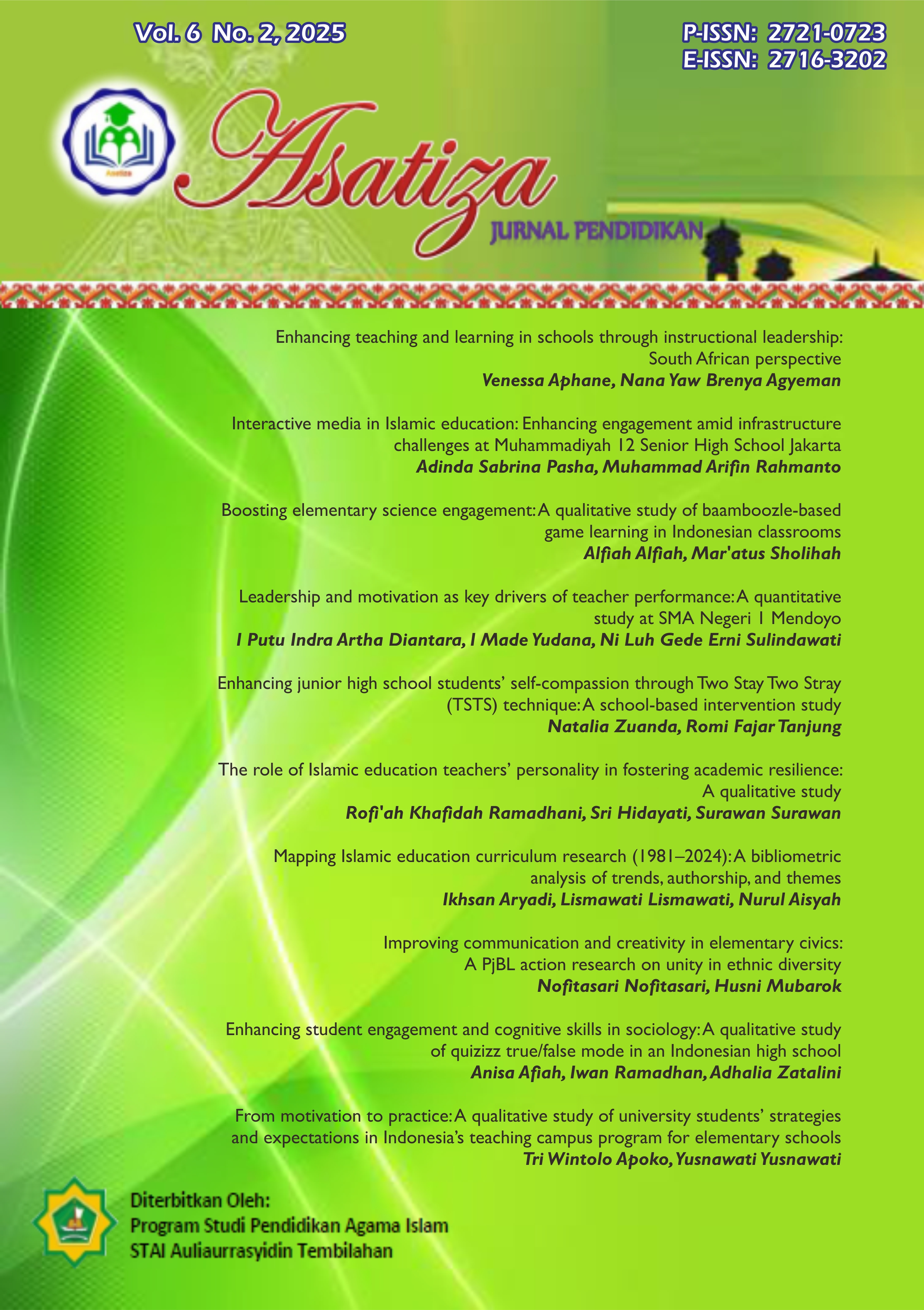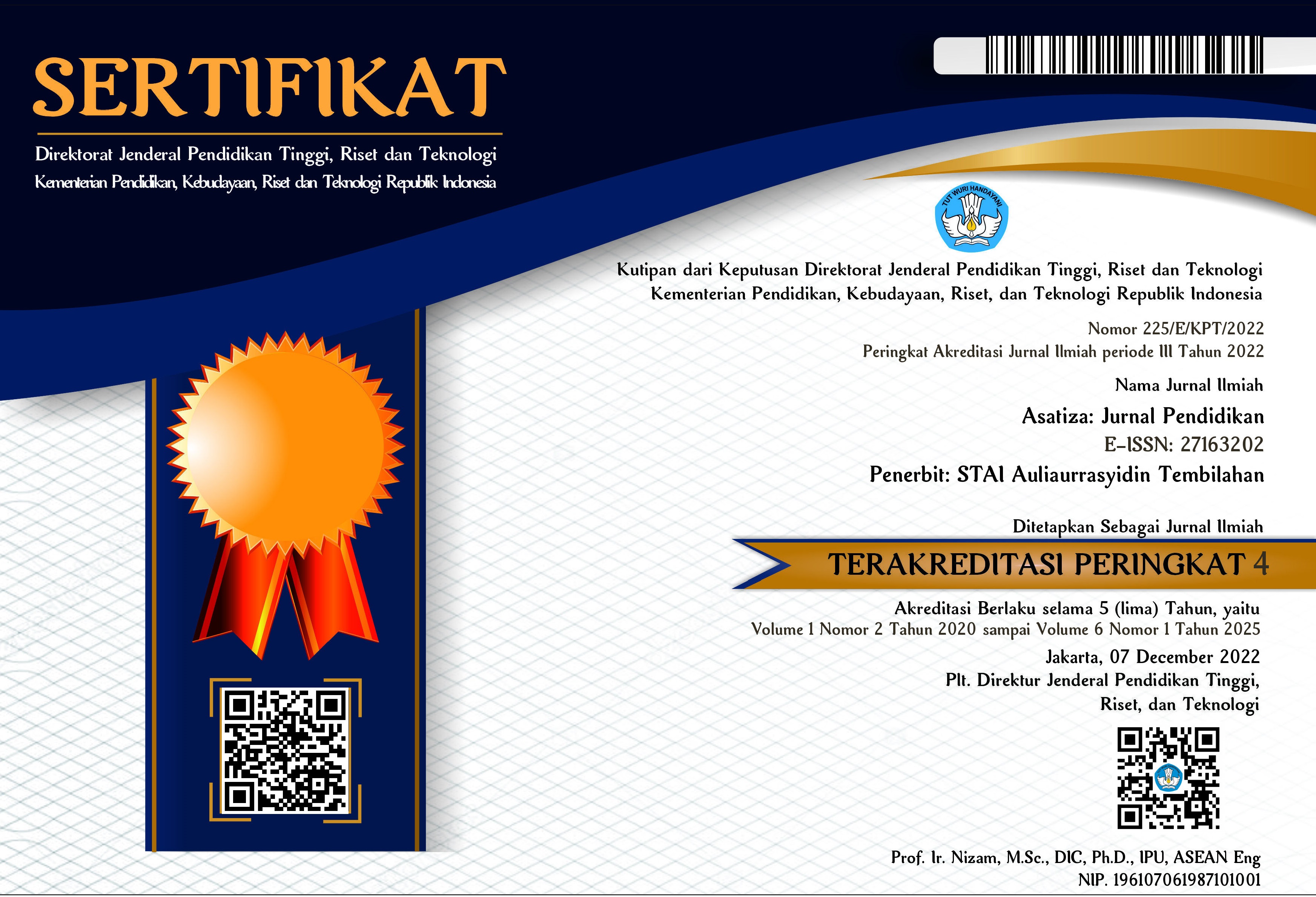Boosting elementary science engagement: A qualitative study of baamboozle-based game learning in Indonesian classrooms
DOI:
https://doi.org/10.46963/asatiza.v6i2.2726Keywords:
Active Learning, Baamboozle, Game-Based LearningAbstract
This study explores the implementation of Baamboozle-based Game-Based Learning (GBL) to enhance student engagement in science classes at Assunniyyah Kencong Elementary School. Adopting a qualitative case study approach, the research involved 25 third-grade students and science teachers over six weeks. Data were collected through participatory observation, in-depth interviews, and documentation. Findings reveal a marked improvement in student participation, including a 45% increase in verbal engagement, a 27–38% rise in discussion involvement, and stronger collaborative skills. The most notable progress occurred in initially low-participation classrooms (38% growth). Bamboozled facilitated a differentiated learning environment that accommodated diverse learning styles. Despite technical constraints, adaptive strategies ensured pedagogical effectiveness. Innovation fosters 21st-century skills and suggests potential for broader paradigm shifts in elementary education. This study underscores the value of GBL in promoting active learning while highlighting practical considerations for its implementation.
Downloads
References
Afiyah, K. N., & Sutriyani, W. (2024). Efektivitas metode game-based learning berbantuan media flashcard pecahan terhadap hasil belajar matematika siswa. LINEAR: Journal of Mathematics Education, 5(2), 171–180. https://doi.org/10.32332/xmy86j91
Aini, L. N., & Purwaningsih, S. M. (2024). Pengaruh metode pembelajaran game based learning berbasis media board game ular tangga terhadap kemampuan penalaran siswa kelas xi SMK Negeri 6 Surabaya. AVATARA: Journal Pendidikan Sejarah Volume, 15(3), 1-12. https://ejournal.unesa.ac.id/index.php/avatara/article/view/63430
Altinay, Z., Altinay, F., Sharma, R. C., Dagli, G., Shadiev, R., Yikici, B., & Altinay, M. (2024). Capacity building for student teachers in learning, teaching artificial intelligence for quality of education. Societies, 14(8), 148. https://doi.org/10.3390/soc14080148
Anggraini, T. W., Febriyanti, D. P., Sakinah, A. P., Safitri, A., & Annur, S. (2020). Pengaruh metode game based learning terhadap pemahaman belajar peserta didik pada mata pelajaran IPA di MI Al Awwal Palembang. Jurnal Review Pendidikan Dan Pengajaran, 7(3), 6760–6768. https://doi.org/10.31004/jrpp.v7i3.28857
Braun, V. and Clarke, V. (2006) Using thematic analysis in psychology. Qualitative Research in Psychology, 3, 77-101. http://dx.doi.org/10.1191/1478088706qp063oa
Creswell, J. W. (2020). Penelitian Kualitatif & Desain Riset. Yogyakarta: Pustaka Pelajar
Febrianty, G.S., Ramadhan, I., & Zatalini, A. (2024). Implementation of the game based learning model using baamboozle media as an evaluation of students. ICoCSE Proceedings, 1, 196–202. https://jurnal.untirta.ac.id/index.php/ICoCSE/article/view/30018
Fonseca, I., Caviedes, M., Chantré, J., & Bernate, J. (2023). Gamification and game-based learning as cooperative learning tools: A systematic review. International Journal of Emerging Technologies in Learning (IJET), 18(21), 4–23. https://doi.org/10.3991/ijet.v18i21.40035
Haryanto, S., Zahra, R., Merakati, I., Hanafiah, H., Haryati, H., Thasimmim, S. N., & Arifianto, T. (2024). Pembelajaran berbasis game: Pelatihan membuat media pembelajaran menarik dengan teknologi. Community Development Journal: Jurnal Pengabdian Masyarakat, 5(1), 868–883. https://doi.org/10.31004/cdj.v5i1.24930
Maharani, M., Aminuyati, A., Wiyono, H., Buwono, S., & Karolina, V. (2024). Efektivitas model pembelajaran game-based learning terhadap hasil belajar peserta didik pada pembelajaran IPS kelas vii SMP Negeri 6 Pontianak. Journal on Education, 6(3), 15707-15714. https://doi.org/10.31004/joe.v6i3.5403
Manurung, D. G., Butar, Z. B., Siregar, S., Butar, J. B., & Simanjuntak, N. (2025). Efektivitas penggunaan metode pembelajaran berbasis permainan untuk mengatasi kemalasan siswa SD 124398 Pematangsiantar. Jurnal Pendidikan Tambusai, 9(1), 4877–4879. https://jptam.org/index.php/jptam/article/download/25191/17164/42808
Muzakka, M. N., Aulia, N., Putri, S. A., & Zulfahmi, M. N. (2025). Game based learning sebagai media pengoptimalan keterampilan 4c. 1. Jurnal Bima: Pusat Publikasi Ilmu Pendidikan Bahasa dan Sastra, 3(1), 249–256. https://doi.org/10.61132/bima.v3i1.1562
Nahampun, S. H., Gurning, P. P., Nexandika, R., Zalukhu, Y. A. A., & Sianturi, M. E. (2024). Efektivitas metode pembelajaran berbasis game dalam meningkatkan motivasi belajar siswa sekolah dasar. Sinar Dunia: Jurnal Riset Sosial Humaniora Dan Ilmu Pendidikan, 3(3), 63–68. https://doi.org/10.58192/sidu.v3i3.2415
Nandhini, S., & Rasyidah, R. (2024). Development of learning instruments based on game-based learning assisted by baamboozle educational game on digestive system material to improve students’ learning outcomes. Prisma Sains: Jurnal Pengkajian Ilmu dan Pembelajaran Matematika dan IPA IKIP Mataram, 12(3), 589–600. https://doi.org/10.33394/j-ps.v12i3.12229
Paulina, C., Rokmanah, S., & Syachruroji, A. (2023). Efektivitas penggunaan model game based learning dalam pembelajaran matematika di SD. Jurnal Pendidikan Tambusai, 7(3), 31348–31354. https://doi.org/10.31004/jptam.v7i3.12114
Pérez, M. E. M, Duque, A. P. G., & García, L.C. F. (2018). Game-Based Learning: Increasing the logical-mathematical, naturalistic, and linguistic learning levels of primary school students. Journal of New Approaches in Educational Research, 7(1), 31-39. https://doi.org/10.7821/naer.2018.1.248
Putri, A. H., Chahyadi, M., Sujanah, T., & Santoso, G. (2024). Efektivitas metode pembelajaran berbasis game dalam meningkatkan keterampilan pecahan pada siswa kelas 5 sekolah dasar. Jurnal Pendidikan Transformatif, 3(1), 1-9. https://jupetra.org/index.php/jpt/article/view/1145
Putri, R. L., Angel, M. V. K., & Setiyawan, H. (2024). Penerapan model pembelajaran digital game based learning (DGBL) pada mata pelajaran matematika siswa kelas v. Atmosfer: Jurnal Pendidikan, Bahasa, Sastra, Seni, Budaya, Dan Sosial Humaniora, 2(3), 118–128. https://doi.org/10.59024/atmosfer.v2i3.889
Ramadhan, I., Imran, I., Syahrudin, H., Ulfah, M., Ismiyani, M., Atmaja, T. S., Dewantara, J. A., Wisely, V. O., Rokiaske, R., & Emita, E. (2024). Workshop penyusunan bahan ajar kurikulum merdeka dalam meningkatkan profesionalisme guru di sekolah perbatasan Indonesia-Malaysia. Jurnal Pengabdian UNDIKMA 5(2), 188–197. https://doi.org/10.33394/jpu.v5i2.9362
Ruslandi, U., Qomariyah, S., & Sumitra, M. (2025). Peran metode pembelajaran diskusi dalam menciptakan keaktifan belajar siswa di MAS Tarbiyatul Islamiyah. 2. Katalis Pendidikan: Jurnal Ilmu Pendidikan dan Matematika, 2(1), 79–90. https://doi.org/10.62383/katalis.v2i1.1203
Sappaile, B. I., Mahmudah, L., Gugat, R. M. D., Farlina, B. F., Mubarok, A. S., & Mardikawati, B. (2024). Dampak penggunaan pembelajaran berbasis game terhadap motivasi dan prestasi belajar. Jurnal Review Pendidikan dan Pengajaran, 7(1), 714–727. https://doi.org/10.31004/jrpp.v7i1.24682
Sativa, F., & Buahana, B. N. (2024). Penerapan pembelajaran STEAM dengan media loose parts untuk meningkatkan keterampilan berpikir kritis anak usia dini. BIOCHEPHY: Journal of Science Education, 4(2), 1093-1098. https://doi.org/10.52562/biochephy.v4i2.1367
Shiddiq, I., Sari, M., Nasution, Z. A., Purba, H. N., Kurniati, A., Junitri, A., Yanti, N., …, & Syahputri, H. (2025). Implementasi penggunaan media baamboozle untuk meningkatkan motivasi belajar matematika kelas 4 SDN 11 Panai Hulu. Indo-MathEdu Intellectuals Journal, 6(1), 532–539. https://doi.org/10.54373/imeij.v6i1.2501
Simanjuntak, M. M., Saragih, A. D, Simanjuntak, C. J., Tambunan, E. P., Purba, M. S. D., Lingga, R. H., Gultom, R. V., & Simanjuntak, O. (2024). Penerapan model pembelajaran game based learning untuk meningkatkan minat belajar siswa pada mata pelajaran ipa kelas iv SD 094155 rambung merah. Pendas: Jurnal Ilmiah Pendidikan Dasar, 9(4), 912–919. https://doi.org/10.23969/jp.v9i04.21375
Supriana, E., Liliani, N. T., & Luthfia, R. Z. (2024). tantangan implementasi pembelajaran berdiferensiasi: Sebuah studi literatur. Jurnal Pembelajaran, Bimbingan, dan Pengelolaan Pendidikan, 4(9), 9–9. https://doi.org/10.17977/um065.v4.i5.2024.9
Tamrin, M., Sirate, S. F. S., &Yusuf, M. (2011). Teori belajar konstruktivisme Vygotsky dalam pembelajaran matematika. SIGMA: Jurnal Pendidikan Matematika, 3(1). 40-47. https://doi.org/10.26618/sigma.v3i1.7203
Titus, S., & Ng’Ambi, D. (2023). Digital gaming for cross-cultural learning: Development of a social constructivist game- based learning model at a South African university. International Journal of Game-Based Learning, 13(1), 1–20. https://doi.org/10.4018/IJGBL.331995
Wahidah, N. I., Sari, W. R., Festiana, I., & Nasir, N. (2020). Game based learning: Design a multimedia with DDD-E model for mathematics education. International Journal of Emerging Technologies in Learning (iJET), 15(21), 277–284. https://doi.org/10.3991/ijet.v15i21.16353
Wardani, M. E., & Kiptiyah, S. M. (2024). Game-Based learning model with baamboozle media based on artificial intelligence increases student engagement and learning outcomes. Jurnal Ilmiah Sekolah Dasar, 8(2), 293–303. https://doi.org/10.23887/jisd.v8i2.67141
Widiana, I., W. (2022). Game based learning dan dampaknya terhadap peningkatan minat belajar dan pemahaman konsep siswa dalam pembelajaran sains di sekolah dasar. Jurnal Edutech Undiksha, 10(1), 1–10. https://doi.org/10.23887/jeu.v10i1.48925
Witasari, R. (2023). Belajar dan Pembelajaran dari Perspektif Teori Kognitif, Behaviorisme Konstruktivisme dan Sosiokultural. BASICA: Journal of Primary Education, 3(2), 257–268. https://doi.org/10.37680/basica.v3i2.5764
Wulandari, S. A., & Safitri, S. (2024). Penerapan Metode Game Based Learning Dalam Materi Sejarah Bandung Lautan Api Di Kelas XI IPS SMA Negeri 4 Pagar Alam. Jurnal Inovasi Pendidikan dan Ilmu Sosial, 2(1), 34–41. https://ejournal.uniramalang.ac.id/index.php/jipsos/article/view/3507
Wulandari, W., & Widiansyah, A. T. (2023). Penerapan model pembelajaran games based learning untuk meningkatkan kemampuan literasi dan numerasi siswa. Jurnal Pendidikan dan Pembelajaran IPA Indonesia, 13(3), 113–119. https://doi.org/10.23887/jppii.v13i3.73462
Downloads
Published
Issue
Section
License
Copyright (c) 2025 Alfiah Alfiah, Mar'atus Sholihah

This work is licensed under a Creative Commons Attribution-ShareAlike 4.0 International License.
Authors who publish with this journal agree to the following terms:
1. Copyright on any article is retained by the author(s).
2. The author grants the journal, right of first publication with the work simultaneously licensed under a Creative Commons Attribution shareAlike 4.0 International License that allows others to share the work with an acknowledgment of the work’s authorship and initial publication in this journal.
3. Authors are able to enter into separate, additional contractual arrangements for the non-exclusive distribution of the journal’s published version of the work (e.g., post it to an institutional repository or publish it in a book), with an acknowledgment of its initial publication in this journal.
4. Authors are permitted and encouraged to post their work online (e.g., in institutional repositories or on their website) prior to and during the submission process, as it can lead to productive exchanges, as well as earlier and greater citation of published work.
5. The article and any associated published material is distributed under the Creative Commons Attribution-ShareAlike 4.0 International License











2.png)



